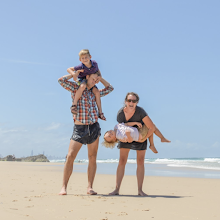Montessori Toys for a One Year-Old
A friend of mine asked for Montessori toy recommendations for a one year-old, and I immediately went to Kylie's post. Sadly, I misread it and thought many of the links were only available in Australia, so I decided to recreate a similar list for my friend (and later realized the Australian links were in addition to the U.S. links!--how long can I blame the post-partum hormones?). There's some overlap, as well as some different items. Henry has enjoyed most of these toys for the past year and a half.
Here are the basic guidelines for choosing Montessori toys for one year-olds:
- They are very concrete thinkers and they are trying to learn all they can about the world. Toys should help them build that understanding (like putting a ball in a hole and watching it roll out or doing basic puzzles).
- As much as possible, toys should have a "control of error." In other words, it should be clear to the child when it's been done correctly or incorrectly (like stacking rings from largest to smallest). That process helps with their problem-solving and independence.
- Toys should be beautiful, attractive, and made of natural materials (like wood versus plastic). Toys should require active engagement from the child (like blocks) as opposed to passive engagement (like battery-operated toys).
- As much as we should offer interesting toys in the environment, we should also just try to spend time outside in nature, following the child's lead as they pick up rocks, hold earthworms, etc.
In a Montessori environment, toys are
set out on shelves that can be accessed by the child. Each toy has its
own spot, as opposed to being thrown into a bin. The idea is that
children's brains are literally absorbing the environment, and order in
the environment helps them build order within their minds. It's also recommended to rotate the toys out every couple weeks (putting away the
current ones and bringing out old ones), so the environment is
stimulating and attractive. I never have enough toys to do this!
Instead, I just have an area for Henry in every room (except our
bedroom).
Honestly, many of the toys below are still on his
shelves. He still plays with many of them, often in different ways. Most
of the time, he plays with random things he finds around the house; his
current obsession is playing with Tate's burp clothes.
Around 18 months, children will be ready for more "practical life" activities. I recommend buying a learning tower
at the one-year mark, even though children won't actually use it for helping with cooking for
several more months. They can use it to practice climbing for now. When they're ready to help with cooking, this site and this site have wonderful child-sized utensils. Those sites also have wonderful glass cups for young children to drink from,
porcelain plates to eat from, and real silverware--all of which can be used from the time a child begins eating. Although things will
break from time to time, it's helpful for children to learn that there
are real consequences from throwing things or treating objects without
care. Also, they love to mimic the adults around them by using
child-size replicas of adult objects.
Without further ado, here are some toy recommendations!
With
that toy (above) I put away the mallet and take out the rubber that
lines the holes and instead turn it into a "put the ball in the box and
watch it roll out" game. Great for understanding object permanence.













2 comments:
Great list! We bought the Plan Toys cone sorter a little before our daughter turned 1. She loves it more and more.
What is the argument against plastic? Just curious. I personally keep our toys pretty simple. Blocks, dress up clothes, puzzles...but sometimes I wonder if that's just MY preference, if you know what I mean...
Post a Comment